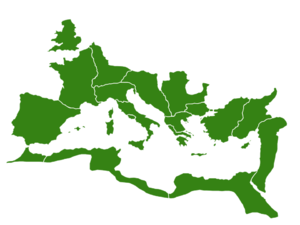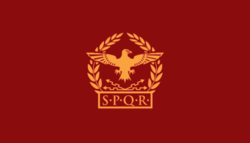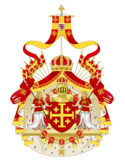Third Roman Empire
Third Roman Empire Tertium Imperium Romanum | |
|---|---|
| Motto: Invicta (Latin: Invincible) | |
| Anthem: In Final Legio (The Final Legion) | |
 Current Roman Claims throughout Africa, Europe, Asia Minor, and the Levant | |
| Capital | Rome |
| Largest city | Constantinople |
| Official languages | Latin, French, Italian, Spanish, Turkish, German |
| Demonym(s) | Roman |
| Government | New Roman System |
| Clementus I | |
• Consul | vacant |
• Praetor | vacant |
| Legislature | Senate |
| Establishment | 2 July 2021 |
| Population | |
• (plus 711 million de jure citizens) (2 citizens are territorial residents) census | 5 |
| Currency | Roman Nummum |
| Time zone | Several |
The Third Roman Empire, or in Latin, Tertium Imperium Romanum, is a micronation and organization claiming de jurely all lands held by the former Roman Empire in 211 AD during the reign of Caracalla. It was founded by two Roman history and political enthusiasts, known in the micronation as Imperator Clementus I and Julius Germanicus. The Third Roman state was not fully conceptualized until late June 2021. The Declaration of Roman Sovereignty and Independence was finalized on July 2, 2021, henceforth being the nation's celebrated independence day. The Roman Constitution was ratified on July 7, 2021, having two parts, one consisting of how government structures should run, and the other half containing the rights of Romans.
Government
The current Roman government is presided over by an temporary autocratic regime, led by Julius Germanicus. The structure of the government is unicameral, consisting of a not yet set number of seats in the chamber, the Roman Senate. All 19 provinces have at least one senator. At most a province can have 4 senators. Senators vote on legislation proposed by either the Consul, Praetor, or constituents asking their Senators to pen legislation regarding a wide variety of topics.
In the executive offices, there are two heads of state and two heads of government. The Consul, like the French or American president, can use executive orders or veto power to block legislation, force penned legislation through, or stop a Senate session entirely. The Consul is elected by an American style electoral vote system. The Praetor, similar to that of a Prime Minister, is the leader of the governing party or coalition in the Senate. The Prime Minister takes on duties of forming a government after an election, creating new legislation and committees, and addressing internal issues.
The Emperor, or Imperator, is the monarch of the Roman state. The Imperator has the task of keeping complete internal stability, signing legislation into law, and enacting unilateral decrees, which cannot be opposed by Senators, the Consul, or the Praetor. The Imperator is also the Chief of the Armed Forces.
Early Days
The Roman state was officially declared on July 2, 2021, with the constitution following thereafter of the Declaration of Independence on July 7.

